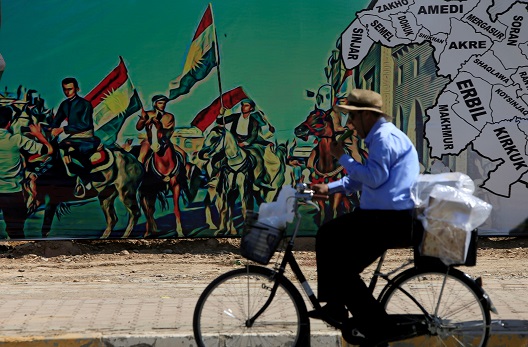Once the United States fully committed to defeat the Islamic State (ISIS, ISIL, Daesh), the ultimate demise of ISIS in Iraq and Syria was never in question. The issue was what to do the ‘day after’ ISIS: specifically, how to transition to a post-ISIS Middle East and to confront the enduring sectarian issues and ethnic fault lines gave rise to ISIS in the first place.
Those policymakers who think we have the luxury of time to ponder post-ISIS challenges given that conclusive defeat of ISIS remains months away are woefully mistaken. The first big ‘day after’ is occurring today, when the Kurdish Regional Government will conduct a referendum to vote for independence. Real independence will take more than a referendum; today’s vote is only on whether there should be an independent state, leaving execution to another day.
Yet US policy, to date, has been limited to persuading the Kurds to postpone this referendum, arguing that the referendum can distract from the fight against ISIS, and, the Kurds postponed referendum until after the Battle for Mosul. Now, though, the Kurds quite clearly have stated that absent US guarantees of support for a specific alternate timeframe, the referendum will proceed. So, despite the United States and other allies’ best efforts to prevent and delay the inevitable, the first post-ISIS challenge is upon us.
This referendum can radically change the geography, politics and stability in the region. Turkey, Iran and Baghdad strongly oppose the referendum. Iranian-backed Shia militias operating in Iraq have already clashed with the Kurdish Peshmerga in Kirkuk and several other disputed areas of Northern Iraq. Several Kurdish leaders have predicted that their first post-referendum fight will be with these Iranian surrogate militias. For all the ‘day-after’ uncertainties, we can be sure of one thing: this referendum will trigger a violent response from these militias and other opponents of an independent Kurdish state. The referendum is also being held in disputed areas—areas that Baghdad and the KRG both claim—raising the specter of internal fighting
Whether or not the United States agrees with the timing of this referendum is irrelevant. Given this reality, what should America do the ‘day after’ the Kurdish referendum?
First, proactive, constructive US engagement is absolutely essential. The decision to proceed with today’s referendum has exacerbated the already serious tensions between Baghdad and Erbil. From 2003 to 2011, when American leaders and forces were deployed in Iraq, whenever Kurdish Peshmerga and the Iraq Army faced off, it was American intervention and mediation that prevented these past Baghdad-Kurd disputes from erupting into violence. When ISIS surged through Iraq in 2014, again, it was American leadership that built the coalition and forced Baghdad and Erbil to cooperate in the fight to defeat ISIS. In these past Baghdad-Erbil crises, direct American engagement and leadership was the difference.
The United States cannot remain in denial that the Kurds are on an irreversible path to a Kurdish State. America has ignored reality on the ground there before. It got it wrong in 2011 with the precipitous and disastrous withdrawal of all American forces, and then in 2014, when it missed the rise of ISIS and its successful campaign. Yes, we can continue to resist the tide of Kurdish independence and rely on hope over reason, failing to act and, once again, live with the tragic consequences of American inaction.
The United States should accept the inevitable and shape the outcome of this process. Only the United States commands the relationships and trust in both Baghdad and Erbil to help manage and constructively steer those negotiations and processes that inevitably will follow the referendum. America is indispensable in this dynamic. It is also in the United States’ strategic best interests to shape the ‘day-after’ in this region for obvious reasons: countering Iranian influence and completing the defeat of ISIS, to name a few.
Second, the Kurds need assistance to further develop the institutions and mechanisms of a state. The United States should work with the Kurds to ease this internal transition to a functional independent state.
Finally, the United States should continue to defend the Kurds. They have been our strongest and most loyal allies in this troublesome region, and the United States is revered by the Kurds for protecting the outgunned and overmatched Kurdish people from threats ranging from Saddam Hussein’s genocide to ISIS’ primitive brutality. We must make it clear that we will continue to ensure the protection of the Kurds going forward.
Make no mistake, the birth of an independent Kurdistan will be hard and will require a trusted midwife. The United States must face reality, roll up its sleeves, and assume this role.
Michael D. Barbero is a retired US Army Lieutenant General who served 3 combat tours in Iraq, is the former commander of the NATO Training Mission-Iraq and director of the U.S. Joint Improvised Explosive Device Defeat Organization. He was a member of Atlantic Council’s Task Force on the Future of Iraq
Image: Photo: A man rides a bike near a mural supporting the referendum for independence of Kurdistan in Erbil, Iraq September 24, 2017. REUTERS/Alaa Al-Marjani
